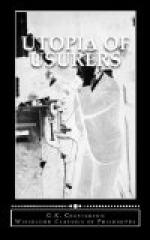Missing the point is a very fine art; and has been carried to something like perfection by politicians and Pressmen to-day. For the point is generally a very sharp point; and is, moreover, sharp at both ends. That is to say that both parties would probably impale themselves in an uncomfortable manner if they did not manage to avoid it altogether. I have just been looking at the election address of the official Liberal candidate for the part of the country in which I live; and though it is, if anything, rather more logical and free from cant than most other documents of the sort it is an excellent example of missing the point. The candidate has to go boring on about Free Trade and Land Reform and Education; and nobody reading it could possibly imagine that in the town of Wycombe, where the poll will be declared, the capital of the Wycombe division of Bucks which the candidate is contesting, centre of the important and vital trade on which it has thriven, a savage struggle about justice has been raging for months past between the poor and rich, as real as the French Revolution. The man offering himself at Wycombe as representative of the Wycombe division simply says nothing about it at all. It is as if a man at the crisis of the French Terror had offered himself as a deputy for the town of Paris, and had said nothing about the Monarchy, nothing about the Republic, nothing about the massacres, nothing about the war; but had explained with great clearness his views on the suppression of the Jansenists, the literary style of Racine, the suitability of Turenae for the post of commander-in-chief, and the religious reflections of Madame de Maintenon. For, at their best, the candidate’s topics are not topical. Home Rule is a very good thing, and modern education is a very bad thing; but neither of them are things that anybody is talking about in High Wycombe. This is the first and simplest way of missing the point: deliberately to avoid and ignore it.
The Candid Candidate
It would be an amusing experiment, by the way, to go to the point instead of avoiding it. What fun it would be to stand as a strict Party candidate, but issue a perfectly frank and cynical Election Address. Mr. Mosley’s address begins, “Gentlemen,—Sir Alfred Cripps having been chosen for a high judicial position and a seat in the House of Lords, a by-election now becomes necessary, and the electors of South Bucks are charged with the responsible duty of electing, etc., etc.” But suppose there were another candidate whose election address opened in a plain, manly style, like this: “Gentlemen,—In the sincere hope of being myself chosen for a high judicial position or a seat in the House of Lords, or considerably increasing my private fortune by some Government appointment, or, at least, inside information about the financial prospects, I have decided that it is worth my while to disburse large sums of money




